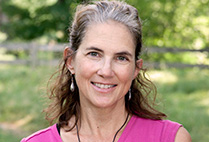What if you could recharge your cell phone just by walking to the office? As an undergraduate at the College of Engineering, Thomas Howe worked on a device that harvests low-frequency motion—human movement—and turns it into energy capable of powering electronic devices. In essence, it transforms people into their own chargers.
“Imagine a centimeter-scale harvester that could be incorporated into a cell phone case,” says Howe (ENG’13), who graduated in May. “As you walk, it extends your battery life by charging the phone up a little bit as you go.” Other possible applications: powering military radios and other small equipment with soldiers’ movements, powering implanted medical devices with the wearer’s motion, and detecting earthquake damage to buildings with built-in sensors powered by the quake itself.
What makes Howe’s project a groundbreaker is that it seeks to efficiently harvest small-scale, low-frequency vibrations. “It’s easy to design a system that works well at a single high frequency, but when that frequency is lowered, it becomes more difficult,” says Howe. He overcame that challenge by devising a way to convert low-frequency vibrations to high-frequency vibrations.
Thanks to funding from the Lutchen Distinguished Fellowship Program—created in 2010 by a gift from an anonymous ENG alum in honor of Dean Kenneth Lutchen—Howe, who took up a former student’s background research, spent the summer before his senior year in the college’s labs developing a lab-scale model of the energy harvester.
“That funding is how I buy groceries and afford tuition,” he says. “If I didn’t have that funding, I would have to go back to my part-time job for income, and I wouldn’t be able to spend time in the lab.”
Howe also received funds from BU’s Undergraduate Research Opportunities Program, which offers undergraduates the opportunity to participate in research projects under the guidance of a faculty mentor, and was a recipient of the Sandra P. Garriques Scholarship, an endowed scholarship for ENG upperclassmen established in 2003 by trustee Ronald Garriques (ENG’86).
The awards were game changers for Howe. “When I came to BU, my mom was in nursing school and my dad was working at a small nonprofit, so like most families, we’d never have been able to afford the full tuition,” he says. “The financial aid I’ve received is a big deal.”
The harvester model that Howe created—currently a meter tall, but with the eventual goal of being just a centimeter—earned him an invitation to present at the IDTechEx Energy Harvesting & Storage Conference in Berlin in April 2013. During the trip, which was also funded by his Lutchen Fellowship, he met with scientists doing similar work, with whom he now collaborates through Skype sessions and email.
What’s next? Howe is pursuing a PhD in MIT’s mechanical engineering department, where he is studying subarctic ocean acoustics—and making plans to send his energy harvester into the depths, to map the seafloor underneath ice sheets.













































Related Stories
US Secretary of Energy Moniz to Receive Honorary Degree
Focuses on clean energy, nuclear issues
BU Team Takes a First at MIT Clean Energy Competition
Software would optimize HVAC in commercial buildings
Lutchen Named to NSF Engineering Panel
Joins leaders from academia and industry who provide advice on support for research, education
Post Your Comment